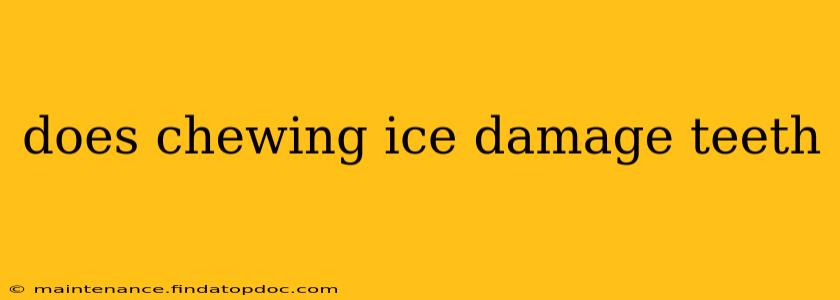Chewing ice may seem harmless, but the reality is that this seemingly innocuous habit can significantly damage your teeth. While the occasional accidental munch on a stray ice cube likely won't cause irreparable harm, consistently chewing ice puts your dental health at serious risk. This comprehensive guide will explore the potential damage, explain why it happens, and offer solutions to break this habit.
Why Does Chewing Ice Damage Teeth?
The primary reason chewing ice damages teeth is its extreme hardness. Ice is far harder than your tooth enamel, the protective outer layer of your teeth. When you bite down on ice, the force combined with the ice's hardness can cause several problems:
-
Cracks and Chips: The most immediate damage is the fracturing of the enamel. Small cracks can develop, leading to larger chips and even complete fractures over time. These cracks can become pathways for bacteria, increasing the risk of cavities.
-
Increased Sensitivity: Once the enamel is compromised, the dentin (the layer beneath the enamel) is exposed. Dentin is significantly more sensitive to temperature changes and pressure, leading to increased tooth sensitivity. You might experience sharp pain when consuming hot or cold beverages or foods.
-
Worn-Down Enamel: Consistent chewing of ice leads to gradual erosion of the tooth enamel. This wearing down weakens your teeth, making them more susceptible to decay, fractures, and other dental problems.
-
Broken Fillings or Crowns: If you have existing dental work like fillings or crowns, chewing ice can dislodge or damage them. This necessitates expensive and time-consuming repairs.
How Can I Tell if Chewing Ice Has Damaged My Teeth?
Recognizing the signs of ice-induced tooth damage is crucial for timely intervention. Watch out for these symptoms:
- Sudden Tooth Pain: Sharp pain when biting down, or sensitivity to hot and cold temperatures, could indicate enamel damage.
- Visible Cracks or Chips: Carefully inspect your teeth in a mirror for any cracks, chips, or discoloration.
- Increased Sensitivity: If your teeth have become more sensitive to temperature changes, it's a warning sign.
- Loose Fillings or Crowns: Notice if any fillings or crowns feel loose or have become dislodged.
What Can I Do to Stop Chewing Ice?
Breaking the habit of chewing ice requires conscious effort and potential behavioral modifications:
- Identify Triggers: Understand what situations or emotions prompt you to chew ice. Are you bored, stressed, or simply have a strong craving for the cold sensation?
- Find Alternatives: Explore healthy substitutes that provide a similar sensation. Consider chewing sugar-free gum, eating crunchy fruits and vegetables (like carrots or apples), or drinking cold water.
- Mindfulness and Awareness: Pay attention to when you reach for ice. The goal is to develop awareness of the habit and consciously choose a healthier alternative.
- Seek Professional Help: If you struggle to break the habit on your own, consider seeking help from a therapist or counselor specializing in behavioral modification.
Is Chewing Ice Ever Okay?
The occasional accidental bite of ice is unlikely to cause significant damage. However, habitual ice chewing is detrimental to your dental health. It's best to avoid chewing ice altogether to maintain a healthy smile.
Can I Repair Ice-Damaged Teeth?
Depending on the severity of the damage, dental treatments can often repair ice-damaged teeth. These may include:
- Fillings: For small chips or cracks.
- Crowns: For more extensive damage.
- Bonding: To repair minor cosmetic flaws.
- Root canal: If the damage reaches the nerve of the tooth.
How Can I Prevent Future Ice Damage?
Prevention is key! Avoid chewing ice consistently, and if you must, do it sparingly and gently. Regular dental checkups are essential to catch any problems early. Your dentist can provide guidance and treatment to maintain optimal dental health.
This information is for general knowledge and does not constitute medical advice. Always consult with a dental professional for any concerns about your oral health.
